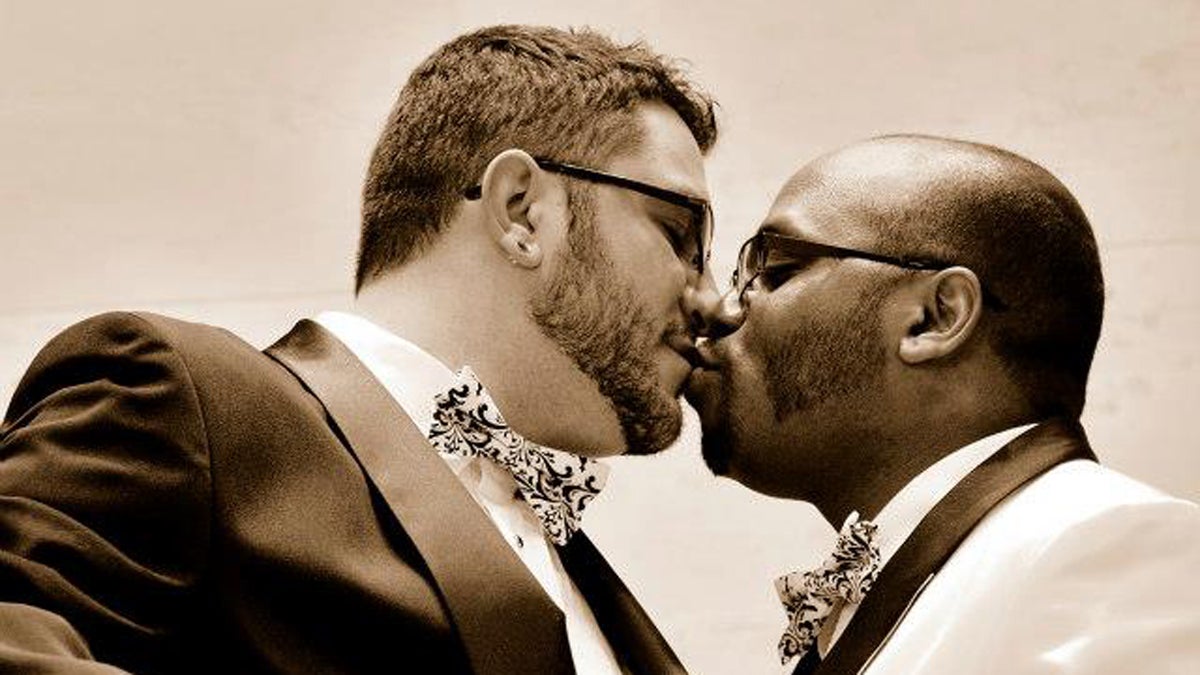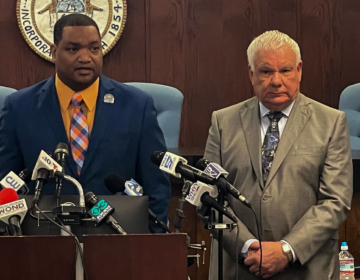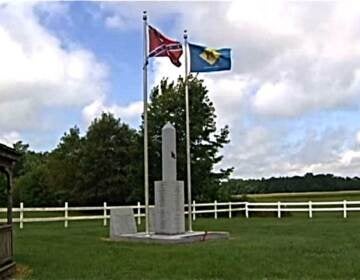How my husband helped me see racism and my dad set aside prejudice
The first time I started seeing things differently was because of Tommy. The rules are different for him than they are for me. I still don't know how he navigates them.

From left: John and Tommy Fisher-Klein share a kiss on their wedding day. (Image courtesy of John Fisher-Klein)
This year marks the 50th anniversary of Loving v. Virginia, the U.S. Supreme Court case that overturned state laws banning interracial marriage. Over five decades, interracial relationships have become more common across the United States, but those couples still face some unique challenges.
Inspired by “The Loving Project,” a podcast featuring the stories of mixed-race couples, we are asking readers to submit essays about their own experiences.
—
I have been a Delawarean all my life. While I’m proud of our blue-state status, the truth is many Delawareans identify as conservative. My family is no different. The Confederate flag was a normal presence in our home, and the n-word and “faggot” were commonly used. Still, my father always denied being racist. In fact, he denied racism existed any more. Black people were as free as any of us, according to him, and the truth was some slaves had it pretty good “back then.” Some were treated well, he said.
In my late teens I finally accepted being gay. I denied it before and long after that, despite accusations and questions from classmates as early as elementary school. I planned to marry a woman anyway, because I was convinced my parents would disown me if I came out. It wasn’t until I left home for college that I realized some people were out and proud.]
I was 20 when I finally came out to my mother, and she shared the news with my father. He and I didn’t speak for six months. When we reconnected, he confessed to being happy I didn’t personally come out to him. He was certain he would have hit me.
Eventually those moments began to seem like someone else’s story. My father and I built a friendship after my mom had a heart attack. Oddly, my older brother’s addiction also strengthened our bond. Dad tolerated my sexuality but made it clear he didn’t understand why I would choose to live “that way.”
Sexuality aside, I became the man he wanted me to be — responsible, independent, and reliable. Truthfully, though, I was not independent. Finally having his approval filled me with a sense of pride, and I was incredibly fearful of losing that.
Not until I met Tommy, the man who would become my husband, did I realize how much of Dad’s teachings had become my beliefs. While I was quite a bit more liberal, I too thought many of the complaints of the black community were nonsense. Look at me: I came from a working-class family, where sometimes ends didn’t quite meet. But I worked hard, like my parents. I went to college, despite our lack of money. I had a good job. If I could grow up in a trailer park and end up a college grad, so could anyone else.
The first time I started seeing things differently was because of Tommy. We were with a group of friends at a local festival. Everyone was drinking and having a good time. The group congregated on the steps of the church hosting the festival. A volunteer walked up to the group, pointed directly at Tommy, and said, “YOU can’t drink on the steps of the church.”
I was stunned. There were at least six of us sitting there, but Tommy was the only person of color. Sadly, that was the first of many instances that helped me see what he faces every day. The rules are different for him than they are for me. I still don’t know how he navigates them.
With that realization, and knowing how my father felt about sexuality and race, I was terrified to tell him I was dating a black man. Tommy was becoming an important part of my life, and I knew I had to tell my father about him. On my next visit home, he and I were drinking in his garage-turned-man-cave, as we often do. I told him about Tommy.
“You’re gay,” he said. “What difference does it make?”
Five years later Dad gave a pretty impressive speech at the wedding — quite a feat for a man who rarely expresses emotion without alcohol to help. It seemed he had managed to set aside his prejudices again and instead focus on those traits he holds dearest. It can’t hurt that my husband has a way of putting people at ease.
In 2015 I realized I was selling Dad short. I imagined him compartmentalizing and tolerating my sexuality and my husband’s race — he didn’t like either, but he would deal with both because, otherwise, we are good people. On June 17, 2015, Dylann Roof murdered nine people in the Emanuel African Methodist Episcopal Church in Charleston, South Carolina. He brutally took their lives for no other reason than the color of their skin.
A few weeks later I was visiting my parents, and Dad and I were drinking in the garage again. “Do you notice anything different?” he asked.
I didn’t.
“The flag,” he said.
And then it hit me. The large Confederate flag was no longer hanging on the wall. I was stunned that its absence didn’t register.
“After what that kid did in South Carolina, I got to thinking,” he said. “It must make Tommy pretty uncomfortable to see that here. And I don’t want him to be uncomfortable. So I took it down and I threw it away.”
It turns out Dad wasn’t just tolerating my sexuality or my husband’s race. He was growing. He was changing. And I needed to keep up.
—
John Fisher-Klein lives in Wilmington, Delaware, with his husband, Tommy, their dog, Hero, and their cat, Villain. John is a graduate of the University of Delaware and Wilmington University. He works in nonprofit management and enjoys gardening and bourbon.
WHYY is your source for fact-based, in-depth journalism and information. As a nonprofit organization, we rely on financial support from readers like you. Please give today.




